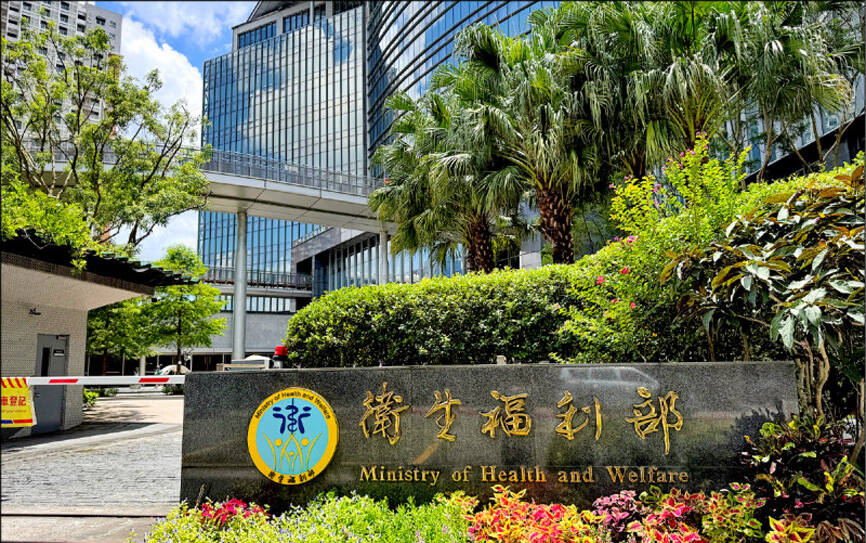Opinions on the Ministry of Health and Welfare’s proposal to tighten requirements for doctors to perform cosmetic surgeries differ, with medical groups issuing joint statements in support or against the policy change.
The ministry earlier this month announced its draft amendments to the Regulations for Using Specialized Equipment for Medical Examinations (特定醫療技術檢查檢驗醫療儀器施行或使用管理辦法), setting different qualification criteria for physicians performing cosmetic treatments depending on risk levels.
The proposed revisions would also require new physicians to finish two years of post-graduate training to qualify as cosmetic surgeons, and that clinics offering high-risk cosmetic surgeries would be subject to mandatory accreditation.

Photo: Taipei Times
The draft amendments are open for public comment for 30 days.
Last week, Taiwan Society of Aesthetic Plastic Surgery (TSAPS) executive council member Chiu Cheng-hung (邱正宏) said that they were concerned the draft amendments lack transparency and evidence, and might have a big impact on the jobs of more than 10,000 workers at nearly 1,000 clinics.
Yesterday, TSPAS and five other medical groups — the Taiwan Aesthetic Medicine Industry Association, Taiwan Academy of Facial Plastic and Reconstructive Surgery, Laser and Photonics Medicine Society of Taiwan, Taiwan Micro Invasive Aesthetic Society and Taiwan Association of Aesthetic Plastic Surgery — issued a joint statement expressing their concerns.
“When the public health authority sets medical policies, it should make a comprehensive consideration that is legal, fair and democratic,” they said.
Mandatory accreditation conflicts with existing law and is suspected of favoring a single accreditation facility, they said.
The government has touted the biomedical industry as a future star industry, but is now censuring and controlling, rather than encouraging, it, they added.
Mandatory accreditation is unnecessary, as Article 62 of the Medical Care Act (醫療法) already stipulates that hospitals shall establish medical care treatment quality control systems, and review and assess quality, while operations are regulated by several laws, they said.
“Accreditation should not be the ‘invisible hand’ used by the government to control the industry, and allowing the Joint Commission of Taiwan to be the single accreditation facility violates the principle of fairness,” they said.
Meanwhile, the Taiwan Hospital Association, Taiwan Nongovernmental Hospitals and Clinics Association, Taiwan College of Healthcare Executive and Taiwan Union of Nurses Association yesterday also issued a joint statement voicing their support for the draft amendments.
Safeguarding life cannot be discussed in marketing terms and healthcare protection must adopt the highest standards, they said.
Saying that “doctors might lose their jobs” is inaccurate, as “the nature of healthcare should be holistic care, not singularly dependent on cosmetics operations,” they said, adding that requiring doctors to undergo additional training shows that people’s safety is being prioritized.
The Joint Commission of Taiwan is the only legal accreditation facility, and the accreditation system is a necessary tool to guarantee healthcare quality, they said.
Moreover, the amendments’ proposed three-level risk management clearly differentiates between risks and would improve healthcare quality, they said.

The Ministry of Foreign Affairs (MOFA) yesterday voiced dissatisfaction with the Comprehensive and Progressive Agreement for Trans- Pacific Partnership (CPTPP), whose latest meeting, concluded earlier the same day, appeared not to address the country’s application. In a statement, MOFA said the CPTPP commission had "once again failed to fairly process Taiwan’s application," attributing the inaction to the bloc’s "succumbing to political pressure," without elaborating. Taiwan submitted its CPTPP application under the name "Separate Customs Territory of Taiwan, Penghu, Kinmen and Matsu" on Sept. 22, 2021 -- less than a week after China

THE GOOD WORD: More than 100 colleges on both sides of the Pacific will work together to bring students to Taiwan so they can learn Mandarin where it is spoken A total of 102 universities from Taiwan and the US are collaborating in a push to promote Taiwan as the first-choice place to learn Mandarin, with seven Mandarin learning centers stood up in the US to train and support teachers, the Foundation for International Cooperation in Higher Education of Taiwan (FICHET) said. At the annual convention of the American Council on the Teaching of Foreign Languages held over the weekend in New Orleans, Louisiana, a Taiwan Pavilion was jointly run by 17 representative teams from the FICHET, the Overseas Community Affairs Council, the Steering Committee for the Test of Proficiency-Huayu, the

A home-style restaurant opened by a Taiwanese woman in Quezon City in Metro Manila has been featured in the first-ever Michelin Guide honoring exceptional restaurants in the Philippines. The restaurant, Fong Wei Wu (豐味屋), was one of 74 eateries to receive a “Michelin Selected” honor in the guide, while one restaurant received two Michelin stars, eight received one star and 25 were awarded a “Bib Gourmand.” The guide, which was limited to restaurants in Metro Manila and Cebu, was published on Oct. 30. In an interview, Feng Wei Wu’s owner and chef, Linda, said that as a restaurateur in her 60s, receiving an

Kaohsiung Mayor Chen Chi-mai (陳其邁) on Monday announced light shows and themed traffic lights to welcome fans of South Korean pop group Twice to the port city. The group is to play Kaohsiung on Saturday as part of its “This Is For” world tour. It would be the group’s first performance in Taiwan since its debut 10 years ago. The all-female group consists of five South Koreans, three Japanese and Tainan’s Chou Tzu-yu (周子瑜), the first Taiwan-born and raised member of a South Korean girl group. To promote the group’s arrival, the city has been holding a series of events, including a pop-up